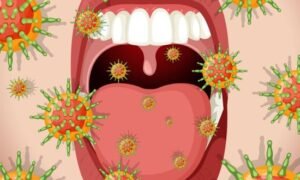When it comes to oral health, it’s essential to differentiate between common conditions like canker sores and the more serious concern of cancer. These both conditions manifest in the mouth but their causes, symptoms and implications are vastly different. Understanding the key dissimilarities between canker sores vs. cancer helps in prompt intervention and prevents unnecessary anxiety regarding oral health concerns.
Understanding Canker Sores Vs. Cancer
Canker sores is a general term which is medically known as aphthous ulcers. They are common oral lesions that often cause discomfort but are usually harmless. Oral cancer refers to abnormal cell growth in the mouth or throat. There can be many types of oral cancers, including those affecting the lips, tongue, gums, inner lining of the cheeks, floor of the mouth, palate and throat. For timely identification and appropriate medical care, it is important to understand the diverse causes, characteristics and management approaches between canker sores and oral cancers.
Causes
Distinguishing between canker sores vs. cancer requires careful observation of oral lesions and understanding their underlying causes. Brief summary of major causes and risk factors of canker sores and oral cancers are as under:
Canker Sores:
- Minor Injuries: Accidental biting of the cheek or tongue.
- Hormonal Changes: Fluctuations during menstruation or pregnancy.
- Stress and Diet: Emotional stressors and certain foods like spicy or acidic items.
- Nutritional Deficiencies: Lack of vitamins B-12, zinc, folic acid, or iron.
Oral Cancers:
- Tobacco Use: Smoking, chewing tobacco, or any form of tobacco consumption.
- Alcohol Consumption: Excessive and prolonged intake increases risk.
- HPV Infection: Specific strains like HPV-16 are associated with oral cancers.
- Sun Exposure: Prolonged exposure without lip protection can cause lip cancer.
Characteristics of Canker Sore Vs. Oral Cancer
Canker sores are typically benign and heal within weeks while cancerous oral conditions require immediate medical attention for proper diagnosis and treatment. Major characteristics of these conditions are:
Canker Sores:
- Appearance: Small, round or oval ulcers with a white or yellow center and red border.
- Location: Inside the mouth, on the tongue, cheeks, or base of the gums.
- Discomfort: May cause pain, especially while eating or drinking acidic substances.
Oral Cancers:
- Persistent Sores: Ulcers that don’t heal within a few weeks.
- Abnormal Patches: Red or white patches on tongue, gums, or mouth lining.
- Difficulty: Trouble chewing, swallowing, moving the jaw or tongue.
- Lumps/Swelling: Unexplained growths in the mouth or neck.
Diagnosis of Canker Sores Vs. Cancer
Aphthous ulcers are primarily diagnosed through visual inspection and patient history. However, diagnosis of oral cancers involves comprehensive examinations and tests to confirm the presence and extent of cancerous growths.
Canker Sores:
- Visual Inspection: Dentists or doctors examine the mouth visually to identify characteristic ulcerations.
- Patient History: Inquire about recent injuries, stressors, or dietary habits.
Oral Cancers:
- Physical Examination: Healthcare professionals inspect the mouth, throat, and neck for abnormalities or growths.
- Biopsy: Tissue samples are collected and tested for cancerous cells to confirm diagnosis.
- Imaging Tests: CT scans, MRIs, or PET scans help determine the extent and spread of the cancer.
Treatment and Management
Canker sores typically resolve on their own within a short time and can be managed with over-the-counter treatments. However, oral cancers require immediate medical intervention and various treatment modalities depending on the extent and stage of the disease.
Canker Sores:
- Self-Healing: Typically heal within 1-2 weeks without scarring.
- Over-the-Counter Solutions: Topical treatments or rinses for pain relief.
- Oral Hygiene: Maintaining good oral hygiene and avoiding trigger foods.
- Home Remedies: Rinsing the mouth with saltwater or baking soda solutions may help reduce inflammation and aid in healing.
- Avoiding Trigger Foods: Identifying and avoiding specific foods that trigger canker sores can prevent their recurrence.
Oral Cancers:
- Prompt Medical Attention: Immediate medical care for diagnosis and treatment.
- Treatment Options: Surgery, radiation therapy, chemotherapy, or targeted therapy.
- Post-Treatment Care: Rehabilitation, speech therapy, dental or reconstructive surgery may be necessary.
Canker Sore vs. Cancer: Major Differences
Recognizing the difference between canker sores vs. cancer involves noting persistent sores’ characteristics and any associated symptoms that can indicate a potential malignancy. Here’s some of the major differences:
Canker Sores:
- Benign, non-contagious lesions.
- Often caused by minor injury, stress, or dietary factors.
- Heal within a week or two without scarring.
- Not associated with serious health risks.
Oral Cancer:
- Abnormal cell growth leading to potentially life-threatening conditions.
- Signs include persistent sores, difficulty swallowing, or abnormal patches.
- Linked to risk factors like tobacco use, alcohol consumption, and HPV.
- Requires immediate medical attention for diagnosis and treatment.
| Key Differences | Canker Sores | Oral Cancer |
| Nature | Benign, non-contagious lesions | Malignant cell growth, potentially life-threatening |
| Appearance | Small, round or oval ulcers | Persistent sores, abnormal patches, difficulty chewing/swallowing |
| Causes | Minor injuries, stress, dietary factors | Tobacco use, alcohol consumption, HPV infection, sun exposure |
| Healing Time | Typically heal within 1-2 weeks | Requires immediate medical attention and treatment |
| Health Risks | Not associated with serious health risks | Poses significant health risks, requires treatment interventions |
When to Seek Medical Advice?
It’s essential to consult a healthcare professional if you notice any unusual changes in your mouth or have concerns about oral health. Knowing when to seek medical advice can make a significant difference in managing these conditions:
For Canker Sores:
- If the sores persist for more than two weeks.
- If the pain becomes severe or interferes with eating or drinking.
- If you develop a fever along with the sores.
For Oral Cancer Concerns:
- Any persistent mouth ulcer or sore that doesn’t heal within a few weeks.
- Any unusual growths, red or white patches, or difficulty in mouth movements.
For any further query feel free to contact us at https://medicalinquiries.com/contact-us/
The Bottom Line
Distinguishing between canker sores and oral cancer is essential for maintaining good oral health. While canker sores are typically harmless and heal on their own, oral cancer demands immediate medical attention due to its serious nature. Education about the differences between canker sores vs. cancer will help the individuals to seek timely healthcare advice. Regular dental check-ups, self-examinations and timely consultations with healthcare providers can help in early detection and appropriate management.
Stay vigilant, stay informed and prioritize your oral health!
Disclaimer
Content on this site is written with thorough research and keeping in mind the latest guidelines. However, no content on this site should substitute professional consultation.

Thank you for your sharing. I am worried that I lack creative ideas. It is your article that makes me full of hope. Thank you. But, I have a question, can you help me?
Thank you so much for your kind words! I’m glad you enjoyed my post. I have many other blogs you can read, and I’d appreciate it if you could share them as well!
If you have any questions or topics you’d like me to cover, feel free to let me know!